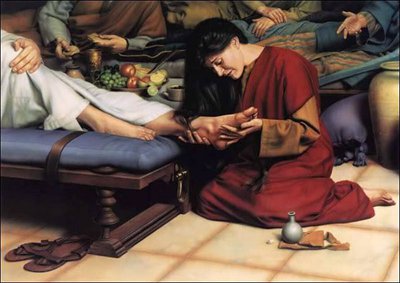Thoughts for the Day
Monday, 25th March 2024: The last week!
John 12 Lazarus Holy week Jesus Martha and Mary
Reading : Verses from John, Chapter 12

Six days before the Passover Jesus came to Bethany, the home of Lazarus, whom he had raised from the dead. There they gave a dinner for him. Martha served, and Lazarus was one of those at the table with him. Mary took a pound of costly perfume made of pure nard, anointed Jesus’ feet, and wiped them with her hair. The house was filled with the fragrance of the perfume. But Judas Iscariot, one of his disciples (the one who was about to betray him), said, ‘Why was this perfume not sold for three hundred denarii and the money given to the poor?’ (He said this not because he cared about the poor, but because he was a thief; he kept the common purse and used to steal what was put into it.) Jesus said, ‘Leave her alone. She bought it so that she might keep it for the day of my burial. You always have the poor with you, but you do not always have me.’
When the great crowd of the Jews learned that he was there, they came not only because of Jesus but also to see Lazarus, whom he had raised from the dead. So the chief priests planned to put Lazarus to death as well, since it was on account of him that many of the Jews were deserting and were believing in Jesus.
(Lectionary, New Revised Standard Version)
Thoughts
So we come to the last week of Jesus' life on earth - to Holy Week! John devotes half his Gospel to this one week, more than any other Gospel. He also has things in a slightly different order and today's incident in a different place to the other Gospels, but his purpose has always been to concentrate on Jerusalem, rather than Galilee, and we should remember that the Gospels were written some 30-60+ years after the incident.
John seems to indicate that the meal given for Jesus is a celebration, probably of his raising of Lazarus. As often happened in that hot and dusty climate when the guests arrived they would have had their feet washed with water and their heads anointed with a touch of oil or perfume by a lowly servant or slave. But a number of things are unusual this time. First, it was carried out while they were eating, though it would happen again at the last meal Jesus had with his disciples, with Jesus taking the place of the lowliest servant (John 13.1-17); second, that Mary carries out the action, and with such a costly perfume - about a year's wage for an ordinary man; and third that she unbinds her hair (the sign of an immoral woman) to use it as a towel.
There are some very important lessons that we can take for ourselves from Mary's action this day: We can learn to be humble before our Lord - in prayer (and perhaps in self-sacrifice); and we can be extravagant with our love for our Lord - with our praise (and perhaps our money). May we reflect on this during Holy Week and take action!
Prayer
Lord Jesus Christ,
may we learn to understand
what it is to be truly humble,
to worship You as You deserve
and to serve others as they deserve.
May we put aside all pride
and self-consciousness,
but continue to grow into the person
that You are nurturing us to be.
Amen.
You might like to find out a little more about Judas Iscariot:
You might like to play this lovely hymn: